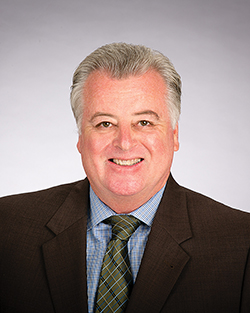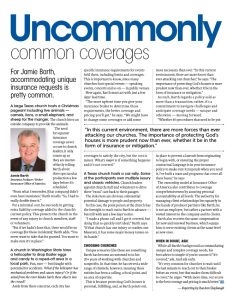
For Jamie Barth, accommodating unique insurance requests is pretty common.

Insurance Producer / Broker
Insurance Office of America
A large Texas church hosts a Christmas pageant including live animals — camels, lions, a small elephant, and sheep for the manger. The church hires an outside company to provide the animals.
The need for separate insurance coverage never occurs to church leaders; it only comes up as they are matter-of-factly telling Barth about their spectacular production a few days before it’s scheduled.
“From what I remember, [that company] didn’t even have insurance,” Barth recalls. “So, I had to really double-time it.”
For a minimal cost, he succeeds in getting extra liability coverage added to the church’s current policy. This protects the church in the event of any injury to church members, staff or volunteers.
“But if we hadn’t done that, there would be no coverage [for those incidents],” Barth adds. “You never want to take that for granted. You want to make sure it’s in place.”
A church in Washington State hires a helicopter to drop Easter eggs and candy to a roped-off area in a local park. Fun, sure — but fraught with potential for accidents. What if the helicopter has mechanical problems and causes injury? Or if the wind from the rotor blades hurls these objects into the crowd?
Aside from these concerns, each city has specific insurance requirements for events held there, including limits and coverages. This is important to know, since many churches host special events — speaking events, concerts and so on — in public venues.
Here again, Barth must act with just a few days’ lead time.
“The more upfront time you give your insurance broker to determine those requirements, the better coverage and pricing you’ll get,” he says. “We might have to change some coverages or add some coverages to satisfy the city, but the cost is minor. What’s major is if something happens and it’s not covered.”
A Texas church hosts a car rally. Some of the participants own multiple luxury and classic vehicles. Church leaders appoint church staff and volunteers to drive these “extra” cars back to their garages.
The risks here are obvious: substantial potential damage to people and property.
In this case, the point person at the church has the foresight to reach out to Barth in advance — but still with just a few days’ notice.
“I made a phone call and I got it covered, but doing that so quickly isn’t ideal,” Barth says. “If that church has one injury or crashes one Maserati, it has some major money issues on its hands.”
Choosing churches

Unique scenarios like these are something Barth has become accustomed to in his 20+ years of working with churches and nonprofits. In that time, he has served a wide range of clientele; however, insuring these entities has been a calling, a focal point, and an area of expertise.
This is because protecting God’s houses is personal, fulfilling, and, as Barth points out, more necessary than ever. “In this current environment, there are more forces than ever attacking our churches,” he says. “The importance of protecting God’s houses is more prudent now than ever, whether it be in the form of insurance or mitigation.”
As such, Barth regards a policy sold as more than a transaction; rather, it’s a commitment to navigate challenges and anticipate coverage needs — unique and otherwise — moving forward.
“Whether it’s procedures that need to be put in place to prevent a lawsuit from originating to begin with, or ensuring the proper contractual language is in your insurance policy to make sure it responds when you need it, I’ve built a team and programs that cover all these bases,” he says.
The ownership model at Insurance Office of America also contributes to coverage comprehensiveness by assuring personal accountability at all levels. The authority for managing client relationships lies squarely in the hands of producer partners like Barth; he is not an employee, but rather a partner with a vested interest in the company and its clients.
Barth also receives the same compensation for new and renewal business, which equips him to serve existing clients at the same level as new ones.
When in doubt, ask!
While all Barth’s background accommodating unique and complex coverage needs, his best advice is simple: if you’re unsure if “it’s covered,” ask. And ask early.
“It’s very common for churches to wait until the last minute to reach out to their broker before an event, but that makes them difficult to cover,” he urges. “With more time, our access to the best coverage and pricing is much better.”
— Reporting by RaeAnn Slaybaugh


